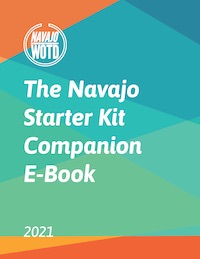hai
winter
hu ee
The Navajo word we have for you today is hai, which is how “winter” is said.
Heading into December, the winter season starts to grow, and snow storms and frequent cloud cover start to develop.
Hai stands in contrast to háí, which we featured earlier. Notice the high tone marks on the latter word; the high tonal characteristic turns this three letter word from winter to -> who (as we outlined in this post).
Winter is the time for the creation stories, string games, shoe games, preparation for the coming planting seasons, and (depending on the flock) when special care needs to given to newborn lambs. In a more contemporary sense, this is also the time when people stock up on hay for livestock, prepare for muddy roads, install stoves where needed, and more. Emergency supplies are also collected for those who are immobilized by big storms, as many Navajo families live in remote areas.
